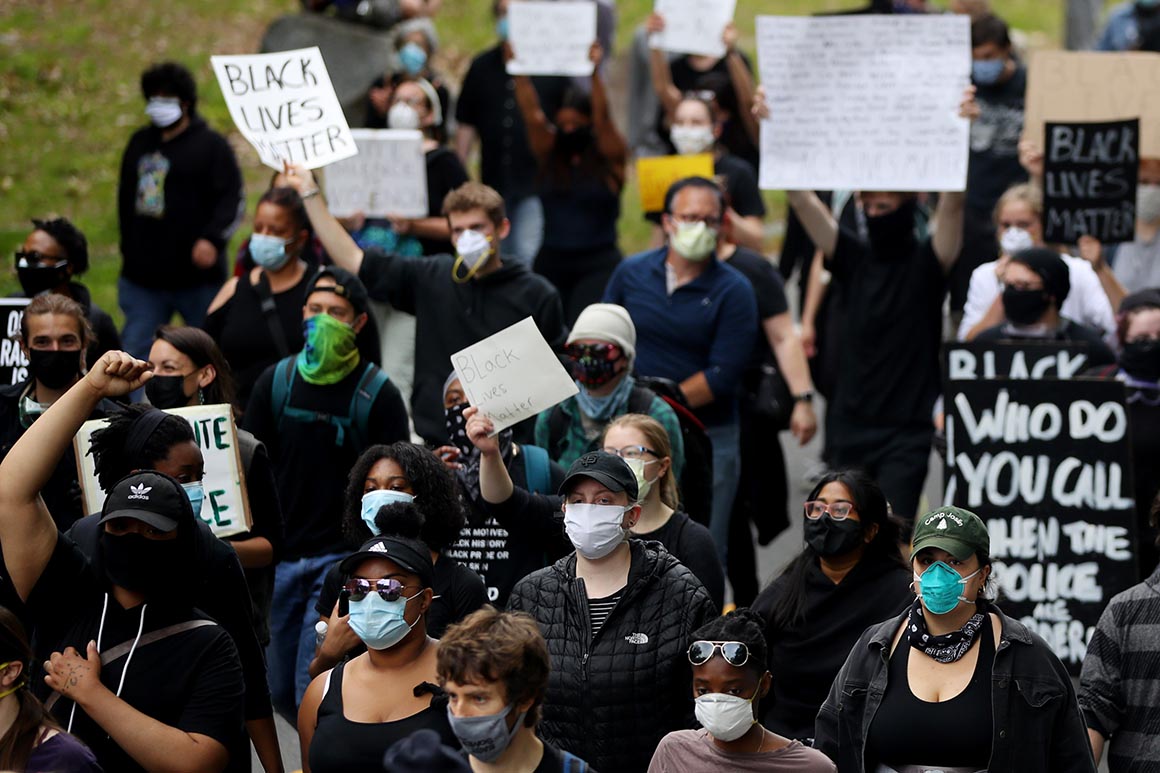
Health experts have identified older Americans and those with underlying health conditions as the people most susceptible to the novel coronavirus. But federal data show that for people between the ages of 5 and 54, more black Americans have died than their white counterparts, despite the fact that nearly 77 percent of the nation is white. The figures suggest black people in those age ranges run a higher risk of getting infected in the crowd or, worse, if they get arrested and held until they post bail, then come back home and become vectors in their communities.
The number of infected Americans, overall, is creeping toward 2 million, and more than 107,000 have already died. African Americans comprise just 13 percent of the U.S. population but have accounted for more than a fifth of the nation’s Covid-19 deaths, according to weekly data maintained by the National Center for Health Statistics, which can lag anywhere from one to eight weeks behind the most recent totals.
“Bear in mind the black community has disproportionately borne the brunt of Covid-19,” Massachusetts Rep. Ayanna Pressley, who is black, said in an interview Wednesday on “CBS This Morning.“
“We are managing that trauma and that loss. A pandemic within a pandemic. A public health pandemic and the scourge that is police brutality layered with the trauma of housing injustice, economic injustice, education injustice and health care injustice.”
Fulton County, where Atlanta is based, has already had the greatest number of cases, hospitalizations and deaths in Georgia. In Atlanta, more than half of positive patients are black and 83 percent of those who have died have been African American.
Kathleen Toomey, Georgia’s health commissioner, told reporters Tuesday that the state is working to set up at least one additional test site for demonstrators and is moving forward with plans to begin testing Atlanta’s first responders as early as next week. She also noted that the state police, National Guard and others will need to be tested.
“We want to ensure that everyone who may be exposed unwittingly also has access to testing quickly and that we can assist in this time to mitigate any potential spread from this demonstration,” Toomey said.
Georgia, however, has the worst testing rate in the country per capita, according to data tracked at covidexitstrategy.org.
Testing sites in Pennsylvania, Illinois and New York closed down after violence broke out over the weekend. Private testing sites in New York City either closed or reduced their hours as protesters were out on the streets, and Minnesota’s public labs were evacuated Friday, though they resumed testing Monday.
Illinois indefinitely shuttered all of its free community testing sites, and Philadelphia closed all of its sites Monday due to protests and looting.
Allison Arwady, Chicago’s health commissioner, called the city’s progress “fragile at best,” warning Tuesday that “our risk is simply higher than it is in other cities.”
“One of the most insidious things about this virus is it has the potential to spread even among people who do not have symptoms,” said Arwady, who urged residents who were in large crowds over the weekend to self-quarantine for 14 days and avoid vulnerable Chicagoans.
“My worry is that we’ve already seen this so disproportionately impact black and brown communities in Chicago,” Arwady said, according to a report from WGN. “What I want is for all of us, especially those communities, is to get on the other side of Covid here.”
Tracey Sunde, an ICU bedside nurse working with coronavirus patients in the Chicago area at Loyola University Medical Center, told POLITICO she has seen the pandemic’s disproportionate impact firsthand with a mix of patients that have been predominantly black or Latino. Those demographics make up more than three-quarters of all coronavirus cases and deaths in Chicago.
“I’m definitely worried” that the protests could set off another wave of cases, said Sunde, who added that while her facility created enough makeshift bed capacity to handle the initial wave, it has also received patients transferred from nearby hospitals that were overwhelmed or lacked specialized equipment.
Pennsylvania’s health secretary, Rachel Levine, acknowledged concerns about the disease spreading at protests in cities like Philadelphia, but she told reporters Monday there were no plans to delay its next phase of reopening.
“We certainly respect Pennsylvanians’ right to protest and demonstrate, especially in these very difficult and challenging times. We would want them to be safe, however, and to wear a mask and practice social distancing as much as possible while they’re exercising their civil rights,” Levine said. “We do have concerns about potential for spread of Covid-19 with mass protests if they don’t practice social distancing. But there are no plans to change anything.”
The city of Philadelphia’s website added new guidance Tuesday for testing for protesters. “Because of the large number of people that have participated in protest activities in Philadelphia, the Health Department believes that there may be an increased likelihood that participants may have been exposed to COVID-19,” the guidance said.
It went on to list a number of recommendations for people who participated or were near protests, even if they wore a face covering. The list includes checking for symptoms over the next two weeks, self-quarantining for 14 days and getting tested a week after being in a crowd.
“Public health authorities throughout the country have been concerned about the impact of these protests if social distancing is not practiced, and if masks are not worn,” Levine said. “And we’ll do everything we can to mitigate that.”
According to the Philadelphia Department of Health, black residents are hospitalized at nearly three times the rate of white residents.
Source: politico.com
See more here: news365.stream






